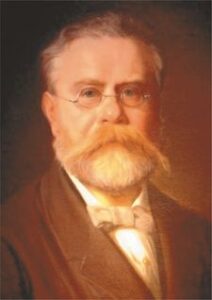Fritz Reuter
 Fritz Reuter was the most important German poet of Low German. Together with Klaus Groth, he is considered the founder of modern Low German literature.
Fritz Reuter was the most important German poet of Low German. Together with Klaus Groth, he is considered the founder of modern Low German literature.
He was born in Stavenhagen on 7th November 1810, the son of the mayor, Georg Johann Jakob Reuter, and his wife, Johanna Luise Sophie, née Oelpke. Fritz received private tuition, albeit on a disorganised and sporadic basis. In 1824, he was admitted to the school for scholars in Friedland. In 1831, he passed his Abitur school leaving certificate in Parchim and then went on to study Law in Rostock and later in Jena. There, he joined the ‘Germania’ fraternity. He was arrested in Berlin in 1833 for his alleged political activities during the Vormärz period. He was sentenced to death in 1836 for lèse majesté and attempted high treason. This sentence being commuted to 30 years imprisonment in a fortress. After spending time in several prisons, including Dömitz Fortress, Fritz Reuter was released in 1840. In 1842, he took up a position as a volunteer with a landowner and met his future wife, Louise, during this time. His literary work began in 1845 with an anonymous publication in “Mecklenburg. Ein Jahrbuch für alle Stände”. Fritz Reuter subsequently wrote about his experiences in numerous works. His works are characterised by satire, humour and a clear view of the ordinary people in his Mecklenburg homeland. In 1857, he published his socially critical work “Kein Hüsung”. In 1863, the Reuters moved to Eisenach in Thuringia, where Fritz continued to write.
Fritz Reuter died in his Eisenach villa on 12th July 1874. His wife, Louise, being his sole heir. She died on 9th June 1894.
Fritz Reuter’s works have been translated all over the world . They are still read to this day in the the both original Low German and in High German translations.
